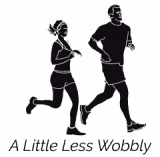I don’t run to keep my body healthy. I run to keep my mind healthy.
Over Christmas I have been thinking about toughness, stress and anxiety AND how to cope better as the pressure comes on.
We all know running is good for reducing stress, but did you know that running makes you tougher? I don’t mean macho tough. I mean mentally more resilient, better able to cope with life, and stress. Better able to respond to the world around us, rather than react to it.
What got me started was The Science of Running, by Steve Magness. Which lead me, via The Growth Equation podcast, to a book by Brad Stulberg called Master of Change. A bit of a journey but following that idea about toughness. Here is what Brad has to say,
“There is a big difference between REACTING to something and RESPONDING to it. In recognising that our emotions are messengers NOT determinants of our behaviour. And the key to toughness, to a less-stressful life, is what you choose to do in the space between the stimulus and the response. Because in that space lies the freedom to choose our actions.
That space represents our agency and humanity. Unlike other animals, we can be thoughtful and discerning instead of instinctively reacting. At the individual level, that space is crucial for mental health. Collectively, it’s what gives rise to civilisation, allowing us to work together, compromise, and resolve disputes without violence.
When faced with change and disorder, most people go down one of two roads: They either respond or react. Responding, is considerate and deliberate. Reacting, on the other hand, literally means to meet one action with another. It is immediate and rash.
Responding creates more space between an event and what you do, or don’t do, about it. In that space, you give immediate emotions room to breathe, you gain a better understanding of what is happening, and you bring online your prefrontal cortex, the most evolved part of your brain. As such, you rarely regret responding. But you often regret reacting.
Plenty has been written about what you can do internally to cultivate responsiveness. For instance, one study showed how affect labelling, or naming your emotions, helps create space between you and a difficult situation. Mindfulness meditation is also beneficial. But the external matters too. You can do all the affect labelling and meditation in the world, yet if you regularly inhabit reactive environments – like work – like social media (or Christmas!), it’s hard not to become a more reactive person.
Our modern economy increasingly relies on capturing people’s attention. The incentives reward speed, flair, and outrage. Reactivity is a feature not a bug. The goal is to be first, to be extreme, and to capture as much gaze as possible.
There are no silver bullet solutions, but explicitly naming and describing the problem is an important first step: Our culture and economy encourage reactivity; as a result, we’re becoming a more reactive people, precisely at a time when our most pressing challenges: war, pandemic, climate change, political dysfunction require our utmost capacity to respond.”
So what? At the start of 2024 I want to encourage you to find a way to create space between stimulus and response.
Read print books or newspapers instead of the digital versions. Go to the gym or take walks without your phone. Set aside spaces to be device free. You could develop constraints for how much time you spend online. At work, consider putting in place a process to encourage a deliberate response even, and perhaps especially, when inertia is pushing for an immediate reaction.
You could even go for run. Consider what happened on that last call and decide on how best to respond. If it’s a big problem, then just run for longer! But find the time, and create the habit to control the space between the stimulus and the response.
It’ll make you a whole lot tougher!
Have a wonderful 2024!

